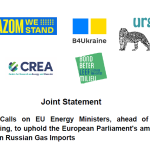The European Commission published today its proposal for financing international development and neighbourhood cooperation after 2020. The proposed instrument falls short of meeting the climate finance needs of the EU’s partner countries, while failing to guarantee that EU financing for international action is fully climate proof and compatible with the Paris Agreement.
In reaction to the proposal, Maeve McLynn, Finance and Subsidies Policy Coordinator at Climate Action Network (CAN) Europe said:
“The new architecture of the EU’s external finance puts a lot of emphasis on foreign policy and EU interests overseas, while undermining the EU’s commitment to provide essential support to countries at the forefront of climate change.”
“There is little or no indication in the new proposal that the future funding architecture for EU external action will be fully compatible with the Paris Agreement. The proposed target of 25% climate relevant spending in development cooperation will not be sufficient to drive ambitious climate action in the EU’s partner countries, particularly vulnerable developing countries.”
ENDS
Contact:
Nicolas Derobert, CAN Europe Communications Coordinator, nicolas@caneurope.org, +32 483 62 18 88
Climate Action Network (CAN) Europe is Europe’s leading NGO coalition fighting dangerous climate change. With over 150 member organisations from 35 European countries, representing over 1.700 NGOs and more than 40 million citizens, CAN Europe promotes sustainable climate, energy and development policies throughout Europe.



